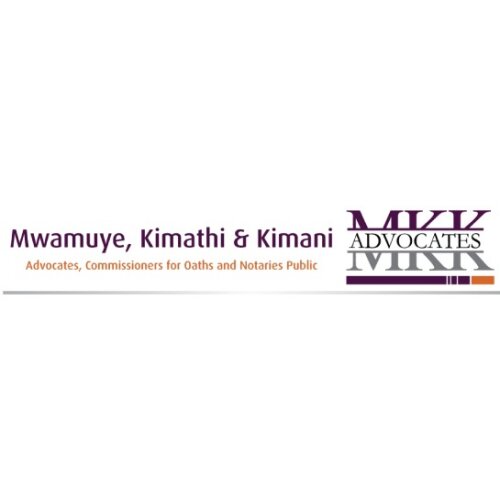Best Water Law Lawyers in Kisumu
Share your needs with us, get contacted by law firms.
Free. Takes 2 min.
List of the best lawyers in Kisumu, Kenya
About Water Law in Kisumu, Kenya
Water Law in Kisumu, Kenya, refers to the legal frameworks, policies, and regulations that govern the ownership, management, use, and conservation of water resources within Kisumu and its environs. Water Law ensures that water resources such as Lake Victoria, rivers, underground water, and public water supplies are fairly allocated, efficiently managed, and used sustainably. It covers issues like water rights, pollution control, access to clean water, and dispute resolution among users such as individuals, communities, industries, and governments.
Why You May Need a Lawyer
Legal assistance in Water Law may be necessary for a variety of reasons. Some common situations where you may need legal help include:
- Disputes over access or rights to water sources such as rivers or communal taps
- Conflicts between landowners and the government regarding water projects or infrastructure developments
- Cases of water pollution or contamination by factories, farms, or households
- Negotiating contracts related to water supply, irrigation, or borehole drilling
- Enforcing the right to clean and safe drinking water
- Dealing with water tariffs, billing disputes, or illegal connections
- Seeking compensation for damage caused by changes in water courses or flood management projects
- Ensuring compliance with water use licensing and regulatory requirements
A qualified lawyer can help interpret the relevant laws, represent you in negotiations or court, and protect your interests.
Local Laws Overview
Water Law in Kisumu is influenced by several national and county laws as well as customary practices. Key aspects include:
- The Constitution of Kenya (2010): Recognizes the right of every person to clean and safe water in adequate quantities (Article 43).
- Water Act (2016): Provides the main legal framework for water resource management, regulation, and service provision. It establishes bodies like the Water Resources Authority (WRA), Water Services Regulatory Board (WASREB), and water service providers such as Kisumu Water and Sanitation Company Limited (KIWASCO).
- Environmental Management and Coordination Act (EMCA): Regulates activities that affect the environment, including water pollution and conservation.
- County Legislation: Kisumu County passes by-laws specific to local water management, such as public health regulations, water rates, waste water management, and development approvals for water projects.
- Customary Law: In some communities, traditional rules regarding communal water management and rights may be recognized, especially in rural or peri-urban settings.
Understanding these laws is essential when addressing water-related issues or disputes in Kisumu.
Frequently Asked Questions
What is the process for getting a water connection in Kisumu?
You need to apply to your local water service provider, such as KIWASCO, providing property details, identification, and proof of ownership or tenancy. The provider assesses feasibility, inspects your site, and then proceeds with connection upon payment of fees.
Who owns water resources in Kisumu?
All water resources are vested in the national government, which holds them in trust for the people as per the Water Act. Individuals or entities do not own water itself but may have rights to use it under specific conditions or licenses.
What are my rights regarding access to clean water?
The Constitution guarantees everyone the right to clean and safe water in adequate quantities. If you are denied access, you may seek redress through administrative channels or the courts.
Can I drill a borehole on my property?
Yes, but you must obtain a permit or license from the Water Resources Authority. The process involves a technical assessment, environmental considerations, and adherence to regulations on usage and environmental impact.
What should I do if my water source is being polluted?
You should report the matter to the National Environment Management Authority (NEMA), Water Resources Authority, or your local water service provider. A lawyer can help you escalate the matter or seek compensation if necessary.
How are water tariffs set in Kisumu?
Water tariffs are regulated by the Water Services Regulatory Board (WASREB), which approves rates proposed by local providers such as KIWASCO following public participation.
What legal frameworks protect water resources from over-extraction or pollution?
The Water Act, EMCA, and local by-laws set out rules on water resource management, including licensing, monitoring, pollution control, and penalties for violations.
Can I be prosecuted for an illegal water connection?
Yes, unauthorized connections to water infrastructure are illegal. Offenders can face penalties, fines, or disconnection. Legal assistance is advised if you are facing such charges.
How are disputes between water users resolved?
Disputes can be settled through negotiation, mediation, relevant administrative tribunals, or the courts. Lawyers help navigate these processes, protect rights, and negotiate settlements.
What role does the County Government of Kisumu play in Water Law?
The County Government is responsible for managing local water infrastructure, enforcing health and environmental standards, and passing by-laws that regulate water services within the county.
Additional Resources
If you require more information or legal assistance with Water Law matters in Kisumu, consider the following resources:
- Water Resources Authority (WRA): Regulates licensing and water resource management.
- Kisumu Water and Sanitation Company (KIWASCO): Local water service provider for Kisumu municipality.
- National Environment Management Authority (NEMA): Regulates environmental protection, including water quality control.
- Kisumu County Government: In charge of county-specific water legislation and public health policies.
- Water Services Regulatory Board (WASREB): National regulator of water service provision and tariff approval.
- Kenya Law: Repository for acts of Parliament, case law, and county legislation.
- Local community-based organizations (CBOs): They often mediate water resource issues and promote public participation.
- Environmental Law Societies and Legal Aid Centers: Provide community education and advocacy support.
Next Steps
If you believe you are facing a Water Law issue in Kisumu, take the following steps:
- Collect all relevant documents and facts related to your situation, including land ownership documents, contracts, correspondence, or reports of pollution.
- Contact the relevant authority or service provider to seek initial resolution or clarification.
- If the issue persists or is complex, consult a lawyer experienced in Water Law to assess your case and advise on the best course of action.
- Your lawyer can help you negotiate with other parties, formalize agreements, represent you in mediation, or file cases before the appropriate tribunal or court.
- Continue to engage with community groups or public participation forums if your issue affects a broader community.
Seeking timely legal advice and understanding your rights and obligations is key to resolving Water Law matters effectively in Kisumu, Kenya.
Lawzana helps you find the best lawyers and law firms in Kisumu through a curated and pre-screened list of qualified legal professionals. Our platform offers rankings and detailed profiles of attorneys and law firms, allowing you to compare based on practice areas, including Water Law, experience, and client feedback.
Each profile includes a description of the firm's areas of practice, client reviews, team members and partners, year of establishment, spoken languages, office locations, contact information, social media presence, and any published articles or resources. Most firms on our platform speak English and are experienced in both local and international legal matters.
Get a quote from top-rated law firms in Kisumu, Kenya — quickly, securely, and without unnecessary hassle.
Disclaimer:
The information provided on this page is for general informational purposes only and does not constitute legal advice. While we strive to ensure the accuracy and relevance of the content, legal information may change over time, and interpretations of the law can vary. You should always consult with a qualified legal professional for advice specific to your situation.
We disclaim all liability for actions taken or not taken based on the content of this page. If you believe any information is incorrect or outdated, please contact us, and we will review and update it where appropriate.









